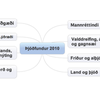Asshole Capitalist
3.3.2009 | 11:23
I just finished reading the article by Michael Lewis called "Wall Street on the Tundra". This may be one of the more interesting articles on the Icelandic economic crisis. It does not so much explain what happened in Iceland in the boring technical, economic terms as it does explain what happened in more entertaining and revealing cultural terms. The article shows a side to Icelandic culture only a foreigner can take note of. Lewis describes Iceland as male dominated and basically says it was the men who ruined the country. Here are some lines from the article-
The best way to see any city is to walk it, but everywhere I walk Icelandic men plow into me without so much as a by-your-leave. Just for fun I march up and down the main shopping drag, playing chicken, to see if any Icelandic male would rather divert his stride than bang shoulders. Nope.
I will soon learn that Icelandic males, like moose, rams, and other horned mammals, see these collisions as necessary in their struggle for survival.
The other, more serious problem was the Icelandic male: he took more safety risks than aluminum workers in other nations did. “In manufacturing,” says the spokesman, “you want people who follow the rules and fall in line. You don’t want them to be heroes. You don’t want them to try to fix something it’s not their job to fix, because they might blow up the place.” The Icelandic male had a propensity to try to fix something it wasn’t his job to fix.
Icelanders—or at any rate Icelandic men—had their own explanations for why, when they leapt into global finance, they broke world records: the natural superiority of Icelanders. Because they were small and isolated it had taken 1,100 years for them—and the world—to understand and exploit their natural gifts, but now that the world was flat and money flowed freely, unfair disadvantages had vanished
Watching Icelandic men and women together is like watching toddlers. They don’t play together but in parallel; they overlap even less organically than men and women in other developed countries, which is really saying something.
One of the distinctive traits about Iceland’s disaster, and Wall Street’s, is how little women had to do with it. Women worked in the banks, but not in the risktaking jobs. As far as I can tell, during Iceland’s boom, there was just one woman in a senior position inside an Icelandic bank.
The best part of the article is the last paragraph which so plainly states what Iceland, and every other nation, is doing when they borrow heavily- they are trying to bring the future into the present.
When you borrow a lot of money to create a false prosperity, you import the future into the present. It isn’t the actual future so much as some grotesque silicon version of it. Leverage buys you a glimpse of a prosperity you haven’t really earned. The striking thing about the future the Icelandic male briefly imported was how much it resembled the past that he celebrates. I’m betting now they’ve seen their false future the Icelandic female will have a great deal more to say about the actual one.
Overall this is a great article for anyone who wants a glimpse of the cultural as well as the technical side to Iceland's crisis.
On the net:
http://www.vanityfair.com/politics/features/2009/04/iceland200904?currentPage=1
GTB

|
Wall Street į tśndrunni |
| Tilkynna um óvišeigandi tengingu viš frétt | |






 axelthor
axelthor
 gattin
gattin
 muggi69
muggi69
 rattati
rattati
 kreppukallinn
kreppukallinn
 fullvalda
fullvalda
Athugasemdir
I guess the only problem with the article is his assumption that this is an Icelandic crisis and not a world crisis that hit Iceland first.
Brynjar (IP-tala skrįš) 3.3.2009 kl. 12:18
Brynyar, It is a world crisis, that much is true. But you have to ask yourself why did the crisis hit Iceland so quickly and so hard? As Lewis writes-
This is what Lewis (and most economists) are trying to tell Iceland today- World crisis or no world crisis the system in Iceland was going to collapse. Lewis writes Bob Aliber had recognized the signs of this "Pefect Bubble" and-
GTB
Gregg Thomas Batson, 3.3.2009 kl. 12:52
Interesting that you should state that "they are trying to bring the future into the present." I'm assuming that this is also what Michael Lewis is attempting seeing as the article is written in April 2009.
Pįll Thayer, 3.3.2009 kl. 13:01
Hjįkįtlegt žegar slśšurdįlkahöfundur fer ķ sparifötinn og fer aš skrifa um hluti sem hann hefur ekki vit į eša ręšur viš. Žett er dęmigerš tröllasaga fyrir trśgjarna og illa upplżsta lesendur žar sem meira er gert meš groddalegar rangtślkanir og afbakanir ķ trausti žess aš lesandinn hafi jafnvel minni žekkingu į mįlefninu en sjįlfur höfundurinn, sem hefur augljóslega hitt ķ mark hjį Gregg.
Greinin er öll gegnsżrš af žeim hroka og dónaskap sem einkennir alla framkomu engilsaxa žegar žeir heimsękja žjóš sem žeir telja vera fyrir nešan sķna eigin ķ goggunarröšinni, eitthvaš sem Gregg augljóslega žjįist af.
Annars hafa ķslendingar almennt žaš orš į sér aš vera višfeldnir og kurteisir, jafnt heima hjį sér og annars stašar, eitthvaš sem ekki er hęgt aš segja um žjóšir eins og bandarķkjamenn og breta sem umturnast ķ hrokafulla dóna žegar žeir bregša sér śtfyrir eigin landamęri. Ég meina, viš hvernig višmóti bżst mannfķlan žegar hann gerir sér žaš aš leik aš ganga į fólk śti į götu? Heimboš ķ kaffi og kleinur?
Annars er žetta karlahaturskjaftęši meš eindęmum og ótrślegt flęšiš af greinum sem eru gegnsżršar af žessu óhefta karlhatri sem og hvert helvķtis fķfliš į fętur öšru er aš dįsama śt ķ gegn. Žessiśrhrök yršu ęf ef svona vęri skrifaš um gyšinga, konur, svertingja eša ašra hópa, en ef žaš er um hvķta karla vętir žaš brękurnar af hrifningu og hrżn afkįtķnu.
bjarni (IP-tala skrįš) 3.3.2009 kl. 23:53
Bjarni,
Yes! Finally! Someone has the balls to write something with some meat to it. I though this blog was going to stay up the whole day without anybody objecting to it. And you did it in Icelandic too. I almost can't stop smiling. Why doesn't everybody write in Icelandic? I don't do it because I would never want to cause Icelanders that much pain. I mean they can see I'm reading the news in Icelandic so I must be able to comprehend something. Although to be honest I struggled through what you wrote, what with words like "karlahaturskjaftęši " (man hating bullshit?). That one is definately not in the dictionary.
To be honest I found Lewis's article more entertaining than informative. And of course he is making some broad generalizations about Icelanders in general and Icelandic men in specific. But all generalizations are built on some small grain of truth and I really can relate to the "bumping into" thing. Not so much on the street but definately in a bar. Every foreigner I know who has lived here for some time will tell the same story. I have relayed this to my Icelandic friends and they have no idea what I'm talking about. I could take you to a packed bar in the US or The UK and walk from one end to the other and you would never touch a soul. And if you did you would most certainly apologize for it.
Sure British and Americans, especially Americans can be the worst tourists, the ugly tourists. What I can say here is Icelanders have no problem dishing out the criticism (sometimes quite enjoyably) but are not really good at taking it. Lewis has a point in saying that the Icelanders ignored criticism of their banks partly because of their cultural superiority complex. Icelanders will tell you they have the best of everything. Some of it is true. The best water, cleanest air, pehaps the most beautiful women, but hey, I lived in California and if I hear one more Icelander tell me that they have the best pot in the world I think I will puke.
And what about this man hating bullshit. Lewis was a bit overboard in this theme , especially "the Icelandic male had a propensity to try to fix something it wasn’t his job to fix." paragraph. I work with Icelanders every day and the reason they try and fix everything is because they usually can. But when it came to the financial crisis even Icelanders themselves were convinced the men were the problem. They immediately put women over two of the three banks, and both Sjįlfstęšis and Samfylking competed to put the first woman prime minister in power to clean up the mess. So again there is a grain of truth in the story.
I do agree that if Lewis had wrote about jews, women, blacks or some other minority in this way it would have created a firestorm. That is just one of the disadvantages of being a white male. And as disadvantages go that ain't much.
GTB
Gregg Thomas Batson (IP-tala skrįš) 4.3.2009 kl. 01:31
Hér mį svara nokkrum hlutum, fyrir žaš fyrsta žį er žetta "bumping into" eitthvaš sem ég hef ekki oršiš neitt sérstaklega var viš, og man žaš svosem ekkert hvort žaš žekkist ekki annars stašar, lęt žaš liggja milli hluta. Ef žetta er tilfelliš žį žaš, getur varla veriš meira pirrandi en "hello how are you?" yfirboršskurteisin sem mętir manni hvar sem er ķ BNA.
Žetta meš aš konur hafi veriš lįtnar hreinsa upp eftir karla er alls ekki samkvęmt raunveruleikanum. Krafan var aš henda spilltu kerfi og taka upp nż vinnubrögš. Ķ hugum ķslendinga hafši žaš ekkert meš kynferši aš gera, heldur hugmyndafręši. Žess vegna var eini bankastjórinn sem ekki mętti andstöšu žjóšarinnar, karlinn sem tók viš KB, konunum sem tóku viš hinum bönkunum var hafnaš af žjóšinni vegna žess aš žęr komu śr spillingarkerfinu. Žęr eru nś į leišinni śt. Slśšurdįlkahöfundi sem leitar aš athygli yfirsést svona atriši, sér bara yfirboršiš og dregur kolrangar įlyktanir. Fréttamašur, sem hefši žaš aš markmiši aš upplżsa frekar en aš afbaka, hefši žurft aš hafa afar lķtiš fyrir žvķ aš komast aš žessari stašreynd žar sem žetta er į vitorši allra ķslendinga. En sjįlfsagt hefur ML bara ekki heft įhuga į stašreyndum, frekar veriš aš leita eftir žvķ aš bśa til skrķpamynd af lķtilli žjóš sem fęstir lesendur hans hafa nokkra žekkingu į.
Hitt atrišiš sem žś mistślkar er aš ķslendingar žoli ekki neikvęša gagnrżni. Žaš er af og frį, ķslenska žjóšarsįlin tekur hóli meš hógvęrš en veltir sér uppśr neikvęšri umfjöllun frį śtlöndum. Žś getur blaša ķ gegnum svörin sem koma viš bloggi Egils Helgasonar į Eyjan.is vegna žessarar greinar. Višbrögšin er ķ rauninni aumkunarverš, svona hįlfgert "žetta er alveg hįrrét, viš erum algjörir vitleysingar, enginn treystir okkur og allir hata okkur", grįtbroslegt ef žetta vęri ekki svona aumkunarvert.
bjarni (IP-tala skrįš) 5.3.2009 kl. 00:42
Bęta viš athugasemd [Innskrįning]
Ekki er lengur hęgt aš skrifa athugasemdir viš fęrsluna, žar sem tķmamörk į athugasemdir eru lišin.